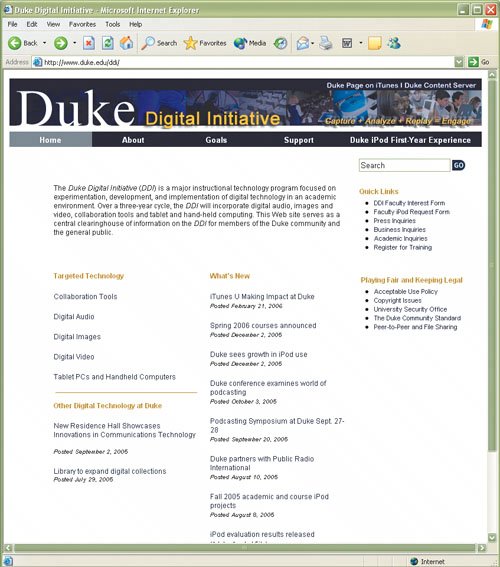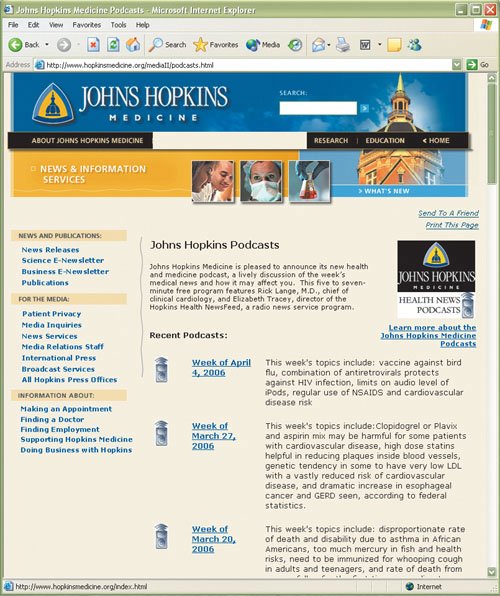Finding Educational Podcasts
| It doesn't take a college grad to see that podcasting can easily play a role in improving education. After all, having an entire semester's worth of lectures available as podcasts could greatly improve a student's chances on the final exam. Duke UniversityIn Chapter 1, I speculated about the future of podcasting and how it might affect education in years to come, but Duke University in North Carolina is already deeply involved in podcasting (Figure 2.48). Figure 2.48. Duke University leaped to the forefront in educational podcasting, giving an iPod to every freshman during the 200304 school year (and every year since). Duke made headlines in the 200304 school year by purchasing iPods for every freshman. These iPods were distributed with an iMic (an iPod accessory that allows for recording, much like an old-fashioned tape recorder) so that students could record lectures as they saw fit. Other classes had lectures recorded as podcasts made available through a special Duke University page in Apple's iTunes Music Store! This concept intrigued me so much that I contacted Professor Richard Lucic, associate chair of the Department of Computer Science at Duke University, and asked him about this pioneering podcasting project. Farkas: What was the genesis of Duke's iPod program? Lucic: It was an outgrowth from discussions that the Information Sciences and Information Studies Program at Duke was conducting with Apple to explore incorporating technology in the classroom. The iPod idea came up during these discussions and was expanded to a campuswide program. Farkas: In a nutshell, how does Duke's program work? Are there microphones in every class so that each lecture is recorded and then turned into a podcast at a central location? Also, are computers supplied for students to download the pertinent podcasts to their iPods? Lucic: This first year, all freshmen were given iPods, but faculty could also make a request to have any course designated an official iPod course, with loaner iPods given to all students. The freshmen get to keep them; the others have to return them at the end of the class. Students were given an iMic in addition to the iPod so that they could record lectures. Duke's Center for Instructional Technology (CIT) would, on request, come and make a recording of the class, but I think most faculty just made the recordings themselves. Duke made a site available to upload class audio content, and Apple also made a Duke-specific iTunes portal available. Farkas: What has the impact of this program been in terms of both objective data and subjective feedback? Have the students taken well to this new educational medium? Lucic: Apparently, the response from both students and faculty was very positive. Duke concluded that incorporating the iPod technology into the classroom did in fact enhance the learning experience. The faculty of the official iPod classes were required to provide feedback from surveys or other vehicles used to poll the students and instructors. Several roundtable discussions with faculty and with students were also conducted to assess the subjective feedback. A couple of the key conclusions of the experiment are that the iPods made learning portable, reaching beyond the confines of the classroom; increased student enthusiasm and work quality; and facilitated the learning process.
Georgia College & State UniversityA small school in Milledgeville, Georgia, recently turned to iPods to improve the way its students are educated (Figure 2.49). Georgia College & State University has about 5,500 students and around 300 faculty members, but despite its relatively small size, this educational institution is making some big strides in podcasting education. Figure 2.49. Georgia College & State University has jumped feet first into the podcasting education revolution. I had a chance to talk with Gregg Kaufman, director of Coverdell Institute at Georgia College & State University, about the school's podcasting initiative. Farkas: What was the genesis of this program? Kaufman: The Coverdell Institute serves the Georgia College & State University Academic Affairs Division as a resource for civic engagement and promoting democratic skills that are necessary for becoming a good citizen. Many of the institute's programs provide opportunities for learning outside the classroom. The Georgia College iPod project appealed to me, as iPod technology has many applications for the institute's work with students, faculty, and community citizens. Consequently, I wrote several proposals to the Office of Technology Solutions and met with the staff. The institute was subsequently approved as one of many iPod project leaders at GC. Farkas: How have the students responded to this concept? Kaufman: I believe students who take advantage of listening to a guest presentation in their discretionary time appreciate the opportunity. I have heard faculty say that listening to podcasts relative to writing grants and learning about university protocols while commuting is extremely helpful. Farkas: What are the hurdles in rolling out a project like this? What technical difficulties have you experienced? Kaufman: We have experienced difficulty capturing the group discussions. It is not possible to record 20 voices with our audio equipment. One of our recent adjustments involves recording the discussion facilitator and one or two participants before and after the discussion, and then creating a podcast to introduce a subject that can be discussed on a blog that extends the weekly discussion. Farkas: Are there any plans to expand this project? Kaufman: There are four things in terms of expansion that come to mind immediately:
Medical PodcastingThe number of medical podcasts filtering into the directory has been increasing at a steady rate. The New England Journal of Medicine, JAMA (Journal of the American Medical Association), the Glasgow Southern Medical Society, the Texas Tech Family Medicine department, and a host of others now have regular medical podcasts for both medical professionals and the general public. I managed to catch up with the two principal characters in one of the most prestigious and famous medical podcasts, "Johns Hopkins Medicine Weekly Health News" (Figure 2.50). Figure 2.50. There are plenty of medical-related podcasts around, but it's hard to top the "Johns Hopkins Medicine Weekly Health News" podcast. The two hosts of this podcast are Elizabeth Tracey, director of "Hopkins Health NewsFeed" (a radio news service program) and Dr. Rick Lange, M.D., chief of clinical cardiology and professor of medicine at the Johns Hopkins School of Medicine. Farkas: What was the genesis of the podcast? How did the idea come about? Tracey: Actually, I thought of the podcast. There was a huge amount of information that started to come out last year about podcasting, including a huge article in The New York Times. Since my background is in electronic media and radio, I thought that this would be a no-brainer for us. I'm fortunate enough to work with Rick, who has a very dynamic and engaging personality, and I had already worked with him in the past, so when I ran through my mental Rolodex to think who would be the best fit for this podcast, Rick immediately came to mind. We decided to look at the latest medical stories and research and then talk about them during the show, because as you know, there is an enormous appetite for this information from the public. There's also an awful lot of misinformation out there, so we thought we could help the situation by presenting accurate information in this format. Lange: Elizabeth's vision, which I fully grasp, is that it be very timely for example, what's happened this weekthat it be very understandable to the lay audience, that it be conversational and personal, and that we get in on the ground floor of podcasting. While we try to make it conversational and personal, it still is hard science, and that's the foundation of what we do. Farkas: What to you is the most exciting aspect of podcasting in general? Lange: The thing that I most enjoy is giving accurate information to a wide audience in a manner that's understandable and enjoyable. Tracey: I feel extremely fortunate in my job. I get to spend my whole day being stimulated by the literature, but both Rick and I feel that it's our raison d'être to convey this to people in a way that can change their lives. If we can't do that, then it's really just so much fluff with no real import. Also, what I really like about it is that we're getting information out there, so that the next time somebody's confronted with a health problem, they can say, "Hey, I've heard something about this from Johns Hopkins, and I can rely on this opinion." Hopefully, then that person can go to their doctor with that information and use it in their health care plan. That's the real driver for me: to get that information out there so that it has some practical application. Farkas: What lies in the future for this podcast? Tracey: This podcast has had an enormous reception, and our numbers are going up constantlythat is, the numbers we can actually track and we are also getting a lot of press about it. As of right now, we're looking for corporate sponsorship for this podcast, and once that's in place, what we'd like to do is start vodcasting. Within the institution of Johns Hopkins, we're also doing an enormous amount of podcasting. Everyone wants it on their Web site. For example, right now I'm working with someone on a whole series of short podcasts on various plastic-surgery procedures.
|
EAN: 2147483647
Pages: 89
- Key #1: Delight Your Customers with Speed and Quality
- Key #2: Improve Your Processes
- Beyond the Basics: The Five Laws of Lean Six Sigma
- Making Improvements That Last: An Illustrated Guide to DMAIC and the Lean Six Sigma Toolkit
- The Experience of Making Improvements: What Its Like to Work on Lean Six Sigma Projects